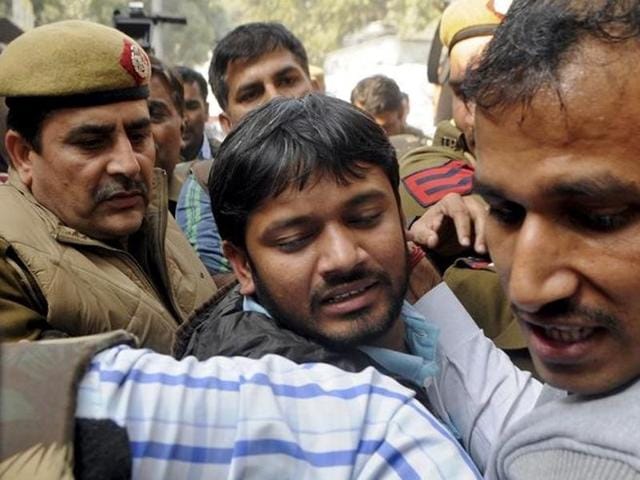JNU row: Student leader Kanhaiya Kumar bail plea to be heard by HC on Feb 22
Jawaharlal Nehru University students’ union president Kanhaiya Kumar, arrested in sedition case, on Friday moved Delhi high court registry for bail.
Jawaharlal Nehru University student leader Kanhaiya Kumar, arrested for alleged sedition, will spend the weekend in jail after the Supreme Court refused on Friday to entertain his bail plea. The top court said approaching it directly would set a dangerous precedent and asked him to move the Delhi high court, admitting the atmosphere in the trial court was not congenial to let his counsel go there.

Kanhaiya’s counsel rushed to the high court with the plea around 3PM. They could not get a hearing after the registry raised some technical objections. Sources said the petition would be heard on February 22.
A mob of lawyers assaulted Kanhaiya during his appearance at Patiala House courts on Wednesday and repeatedly beat up journalists they thought were not suitably patriotic. In the presence of police personnel, the lawyers openly threatened to lynch Kanhaiya and some of them went on to appear in self-congratulatory media interviews.
On Friday, hundreds of defiant lawyers staged a demonstration near the India Gate to assert they would physically assault anyone they deemed anti-national. The lawyers included Vikram Singh Chauhan, the face of the attacks, and Yashpal Singh against whom police issued summons in connection with the court assaults on Monday and Wednesday.
The demonstrating lawyers insisted media personnel chant slogans of “Bharat mata ki jai” if they wanted a quote.
High court Bar Association president Rajiv Khosla urged lawyers to maintain peace and condemned the violence unleashed by them. But Chauhan and Singh appeared unfazed and said they would not think twice before acting against “anti-national” elements. Asked why he did not appear before police as summons were served on him, Chauhan said, “I will act as per instructions given by my seniors.”
“We will keep attacking the anti-nationals no matter what. We will not tolerate any insult to our motherland. Let police issue summons against us,” one of Chauhan’s colleagues told news agency PTI.
Earlier in the day, the Supreme Court asked the high court to decide Kanhaiya’s bail plea expeditiously.
“You are leading a dangerous proposition. If this court will entertain it (bail plea bypassing courts below it), it will become a precedent which will be available to all the accused in the country,” a bench comprising justices J Chelameswar and AM Sapre told Kanhaiya’s counsel, explaining why bail would not be granted by the top court.
“Wherever there will be sensitive cases involving political persons or prominent persons or others... you know the atmosphere in the court.
“So in every case it will be said that Supreme Court is the only court (to hear the matter). This would be a dangerous precedent,” the bench noted.
Under the rules, bail can be sought first only from a sessions court and then the high court. One can approach the top court only after the two subordinate courts decline bail.
Orders were issued to Delhi Police to ensure the counsel got adequate protection during hearings. Solicitor general Ranjit Kumar gave an undertaking to the court that the Centre and Delhi Police would make all the necessary arrangements for smooth conduct of the proceedings.
Meanwhile, a local court rejected the bail application of Delhi University professor SAR Geelani, arrested on sedition charges for allegedly organising an event at the Press Club of India to mark the death anniversary of Parliament attack convict Afzal Guru.
Metropolitan magistrate Harvinder Singh dismissed the bail plea of Geelani, who was on Thursday sent to judicial custody till March 3.





